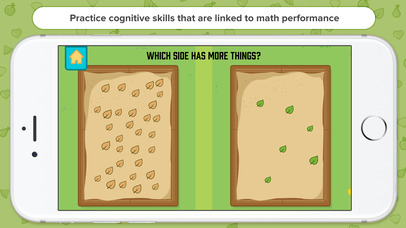
More 4 Monkey: Pre-K Number Foundation app for iPhone and iPad
Developer: Cognitive ToyBox, Inc.
First release : 03 Oct 2016
App size: 61.18 Mb
Help your child get a head start in math with this science-backed game!
Your child will love adventuring through Monkey’s world of school, pools, and picnics, while simultaneously exercising her intuitive sense of quantity, or “number sense.”
Research shows that children with a stronger number sense tend to perform better on real math tests (Halberda et al., 2008). Our games aim to improve your child’s number sense, so he or she will have a leg up at learning math in school.
Four and five year old children who played digital number sense games demonstrated better math performance (on tests of counting, number identification, addition, etc.) compared to control groups, when tested right after a brief practice (Wang et al., 2016) or after several weeks of practice (Park et al., 2016). More 4 Monkey is adaptive and continually challenges your child’s number sense, with a parent dashboard to keep track of progress. Children from ages 2 to 6 enjoy playing More 4 Monkey.
Cognitive ToyBox is committed to developing science-backed games to support the early learning and cognitive development of children. Please contact us at [email protected] with any questions or feedback.
===
References:
Halberda, J., Mazzocco, M. M., & Feigenson, L. (2008). Individual differences in non-verbal number acuity correlate with maths achievement. Nature, 455(7213), 665-668.
Park, J., Bermudez, V., Roberts, R. C., & Brannon, E. M. (2016). Non-symbolic approximate arithmetic training improves math performance in preschoolers. Journal of Experimental Child Psychology, 152, 278-293.
Wang, J. J., Odic, D., Halberda, J., & Feigenson, L. (2016). Changing the precision of preschoolers’ approximate number system representations changes their symbolic math performance. Journal of Experimental Child Psychology, 147, 82-99.



